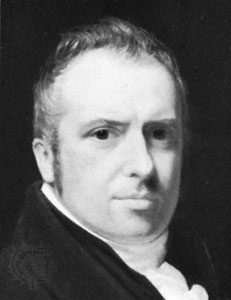Hone, William
English journalist
born June 3, 1780, Bath, Somerset, England
died November 6, 1842, Tottenham, London
 English radical journalist, bookseller, publisher, and satirist, notable for his attacks on political and social abuses. He is remembered primarily for his struggle for the freedom of the English press.
English radical journalist, bookseller, publisher, and satirist, notable for his attacks on political and social abuses. He is remembered primarily for his struggle for the freedom of the English press.Hone taught himself to read from the Bible and became a solicitor's clerk. A radical from 1796, he produced two weekly newspapers, The Traveller (1814–15) and The Reformist's Register (1816–17), in which he exposed injustice and supported extension of the franchise. His report on lunatic asylums in 1814–15 foreshadowed modern journalism in its use of shock tactics supported by fact. In 1817 he published several witty political satires on the Tories in the form of parodies of the Anglican church's prayer book. These pamphlets, notable among which were The Political Litany and The Sinecurist's Creed, led to his prosecution on charges of blasphemy and sedition. In prison while awaiting trial, and despite the risk to his freedom and his ability to provide for his wife and seven children, Hone continued his criticism of the government, publishing articles from his cell. He won his acquittal, which is regarded as a landmark in the history of the press, by a brilliant defense of a journalist's right to free expression. His The Political House That Jack Built (1819), the first and most famous of a series of satires that he produced with the caricaturist George Cruikshank (Cruikshank, George), ran into 54 editions but failed to keep Hone solvent. A bankruptcy (1828) followed his imprisonment for debts incurred in publishing The Every-Day Book (1826–27), the most popular of his miscellanies, and he ended his career as subeditor on a Nonconformist weekly.
- Bethe, Hans
- Bethel
- Bethesda–Chevy Chase
- Beth Henley
- Bethlehem
- Bethlehem, Star of
- Bethlehem Steel Corporation
- Bethlen, Gábor
- Bethlen, István, Count
- Bethmann Hollweg, Theobald von
- Bethune, Louise Blanchard
- Bethune, Mary McLeod
- Beth Yerah
- Beti, Mongo
- Betjeman, Sir John
- Betje Wolff
- Betpaqdala
- betrothal
- Bet Sheʾan
- Bet Sheʿarim
- Betsileo
- Betsimisaraka
- Betsy Rawls
- Betsy Ross
- Bette Davis